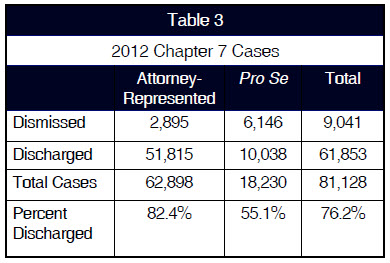Central District of California - 2012 Pro Se Annual Report
Chapter 7, Chapter 13 and Chapter 11


Chapter 7
In 2012, debtors in Chapter 7 cases who were self-represented were seven times more likely to have their cases dismissed than if they had been represented by an attorney (See Figure 7). Debtors represented by counsel in chapter 7 also obtained discharges nearly 83 percent of the time, while those representing themselves in chapter 7 obtained discharges only 55 percent of the time (See Figure 8).
A study of the effectiveness of self-help in a subset of chapter 7 cases filed in 2012 is encouraging. Debtors in the Los Angeles Division who attended a half day self-help seminar offered through Public Counsel’s Self-Help Clinic obtained a discharge a full 93 percent of the time-compared to a 55 percent discharge rate for self-represented parties who did not use the clinic. It is worth noting the debtors attending the seminar appeared more motivated and capable than many chapter 7 debtors, and had access to attorneys each week at the clinic for questions. Also, the seminar is not offered for chapter 13, and the complexity of chapter 13 makes it unlikely similar results would be obtained if it were. The study does, however, clearly demonstrate that the self-help system increases success in good faith pro se chapter 7 filings.

Chapter 13
The difference between attorney-represented and self-represented parties continues to be most pronounced in chapter 13. In 2012, there were only 24 self-represented chapter 13 cases in the entire district that made it to confirmation - a mere 0.2 percent of the chapter 13 cases filed (See Figure 9). The chances of even reaching confirmation (See Figure 10), much less obtaining a discharge, are so miniscule without counsel that proceeding without counsel in chapter 13 should never be considered.
Chapter 11
Of the 60 pro se chapter 11 cases filed in 2012, 50 (83.3%) were dismissed and none had a plan confirmed by the time of this writing. Of the remaining cases, four have been converted to other chapters.
As discussed in last year’s report and obvious once again in this year’s data, there is no question that debtors fare significantly better when represented by counsel. The self-help desks at each division and the Court’s website each direct debtors to counsel, and consistently emphasize that proceeding with an attorney is best. When a party cannot afford counsel, however, or is involved in fraud either as a perpetrator or victim, the reality remains that the cases are usually filed without counsel of record.
Table of Contents
- Introduction
- Self-Represented Parties - The Numbers
- Impact from Assistance by Non-Attorneys
- Debtor ID Program
- Bankruptcy Petition Preparer (BPP) Tracking
- Chapter 7 Success
- Chapter 13 Failure
- Burden on Court Staff
- Fraud and Abuse
- Language Barriers
- Professional Involvement in “Pro Se” Fraud Cases
- New Programs and Services for the Self-Represented
- New Website Launched
- Call Center Implemented
- DVD Created for Self-Represented Parties
- Forms and Instructions
- Assistance from Volunteers and Nonprofit Organizations
- Los Angeles Division
- San Fernando Valley Division
- Santa Ana Division
- Riverside Division
- Northern Division
- Recognition
- Fundraising by Pro Bono Organizations for Non-Court Services
- Run For Justice
- Inaugural Leslie Cohen 5K Run/Walk
- Earle Hagen Memorial Golf Tournament
- Los Angeles Holiday Party
- Santa Ana Holiday Party
- Current Projects “Under Construction”
- Conclusion